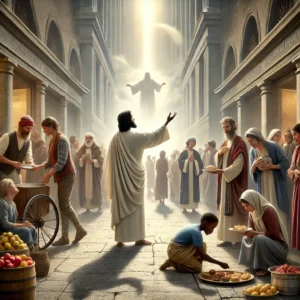
Central to Jesus’ ministry was his teaching on the Kingdom of God. This concept is mentioned frequently throughout the Gospels, representing not only the future hope of God’s rule but also a present reality that transforms lives. Jesus’ teachings about the Kingdom of God challenge worldly values by introducing a new way of life based on love, justice, mercy, and humility. Let’s explore what the Kingdom of God represents and how Jesus’ message upends conventional ideas of power and success.
What Is the Kingdom of God?

The Kingdom of God refers to God’s reign or rule over creation. It is not merely a geographical or political entity but a spiritual reality in which God’s will is done on earth as it is in heaven. Jesus declared the arrival of this kingdom with his coming, saying, “The time has come… The kingdom of God has come near. Repent and believe the good news!” (Mark 1:15). In this way, the Kingdom of God is both already here through Jesus’ ministry and not yet fully realized, awaiting its completion at the end of time.
The Kingdom involves the restoration of justice, peace, and wholeness, reflecting God’s original intent for creation. It is a reversal of the world’s broken systems, where love and compassion replace violence, greed, and oppression.
The Kingdom’s Values: A Reversal of the World

Jesus’ teachings consistently emphasize that the Kingdom of God operates according to values that sharply contrast with worldly systems of power, wealth, and status. The Beatitudes (Matthew 5:3-12) provide a clear picture of the values of the Kingdom, where the poor in spirit, the meek, and the peacemakers are blessed, and righteousness is prioritized over self-interest.
- Humility over Power: Jesus repeatedly taught that greatness in the Kingdom of God is found in servanthood, not in dominance or authority. In Mark 10:43-45, Jesus tells his disciples, “Whoever wants to become great among you must be your servant… For even the Son of Man did not come to be served, but to serve, and to give his life as a ransom for many.” This teaching challenges worldly concepts of success, where power and authority are often pursued at the expense of others.
- Love over Selfishness: Jesus’ teachings center on love—both love for God and love for others. When asked about the greatest commandment, Jesus responded with the Great Commandment: “Love the Lord your God with all your heart and with all your soul and with all your mind… and love your neighbor as yourself” (Matthew 22:37-39). This love is not limited to friends and family but extends even to enemies (Matthew 5:44), a radical call that subverts worldly attitudes of retaliation and hatred.
- Mercy over Judgment: Jesus modeled and taught mercy as a fundamental characteristic of the Kingdom of God. In the Parable of the Unforgiving Servant (Matthew 18:21-35), Jesus highlights that God’s mercy toward humanity must be mirrored by our mercy toward others. The Kingdom calls for forgiveness and reconciliation over judgment and punishment, turning away from the world’s tendency to seek revenge or harbor resentment.
The Kingdom as Present and Future
Jesus’ teachings reveal that the Kingdom of God is both a present reality and a future hope. Through his healings, miracles, and acts of compassion, Jesus demonstrated the Kingdom breaking into the world. His ministry showed that the Kingdom is not just about spiritual matters but also about restoring wholeness to people’s lives—physically, emotionally, and socially.
Yet, the fullness of the Kingdom is also a future event, something that will be completely realized when God brings an end to evil, suffering, and injustice. In the Lord’s Prayer, Jesus teaches his followers to pray, “Your kingdom come, your will be done, on earth as it is in heaven” (Matthew 6:10). This prayer reflects the Christian hope for a world fully transformed by God’s justice and peace.
Challenging Worldly Values

The Kingdom of God stands in direct contrast to the values often celebrated by the world, such as wealth, status, and power. Jesus’ teachings often flipped expectations, challenging his followers to abandon the pursuit of self-interest and embrace a life of humility, service, and love for others.
- Wealth: In the Parable of the Rich Man and Lazarus (Luke 16:19-31), Jesus challenges the idea that wealth equates to favor or success in God’s eyes. The rich man’s failure to care for Lazarus, a poor man, leads to his condemnation, illustrating that in the Kingdom of God, compassion and generosity outweigh material success.
- Status: Jesus often ministered to the marginalized—the poor, the sick, women, and social outcasts—emphasizing that the Kingdom is open to all, regardless of social status. In Matthew 20:16, Jesus says, “So the last will be first, and the first will be last,” reversing societal hierarchies and inviting people to embrace a new way of life focused on inclusion and service.
The Call to Live the Kingdom Now

Jesus’ message about the Kingdom of God is a call to action. He invites his followers to live according to Kingdom values in their everyday lives, reflecting God’s love and justice in the world. This call includes serving the poor, seeking peace, and working for justice. In Matthew 25:31-46, Jesus teaches that acts of kindness and care for the least of these—feeding the hungry, caring for the sick, welcoming strangers—are acts done for him and are essential for participating in God’s Kingdom.
Conclusion
Jesus’ teachings on the Kingdom of God present a radical new way of life that challenges worldly values of power, wealth, and status. The Kingdom is built on humility, love, mercy, and justice, and Jesus calls his followers to embody these values in their lives. As both a present reality and future hope, the Kingdom of God transforms how Christians engage with the world, offering a vision of a world marked by compassion, peace, and righteousness. Through Jesus, the Kingdom is not just a distant promise but a call to live out God’s will here and now.



